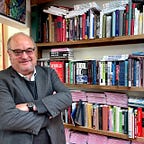Commentary: Changing our consumption habits is a moral imperative
Here is an article I wrote that was originally published by the Albany Times Union on December 24, 2021
The world is aflame with commentary on what we will do regarding climate change and our economy. But what does all this mean for Lark Street, shopping malls, and our Capital Region? What does it mean for your next car purchase, and the spin of your utility dial this winter?
First, some praise. The trillion-dollar infrastructure bill is real, with 33 Republicans supporting it. The money for our highways, bridges, parks, trees will soon roll out across New York, including many rural areas.
Moreover, if the $555 billion blockbuster climate response in the proposed Build Back Better bill comes to pass, America will have come a long way since I sat on Al Gore’s White House councils trying to get lift on climate change. This is larger by six times any other American climate program to date, and its reliance on technical solutions will yield an array of real returns-on-investment and back-to-work jobs. We’d see investment over the next ten years in renewables, electric vehicle charging stations, and hydrogen hubs throughout the Capital Region and other urban hubs. We will see this at our malls, our offices, our medical centers.
But this still does not address the biggest issue of climate change: personal and family consumption habits. That’s where we must do more with less.
We need to change our ways of being consumers, of going about our daily lives, of group gathering in this new age of both capital and carbon contrasts. Otherwise, our social movements remain abstract and troubling at their core. Think of this as a resettling of our region and America. We are Pilgrims on a more inclusive errand. This is deeper and more available than endless debates on the efficiency of our machines. The students of UAlbany, Skidmore College and elsewhere are yelling these themes.
Our consumer delight is becoming recessive. It is time to buy more deliberately. To ignore this is to become economic fools in our age of climate change, social stress, and excessive globalization of consumer whims. The capital markets are shifting. This will make losers of those dependent on coal, fossil, and old ways of hearing the signals of the markets.
Despite the steps forward in legislative and corporate actions, you never realize you’ve been lucky until you know how to declare, “Enough!” Or, “No thanks.” The mantra of “More is More” is a damaging path of excess. It consumes the lives lamented when William Wordsworth wrote, “Getting and spending, we lay waste our powers.”
This emphasis on consumption will not sit well, at first, by those in the leisure class, select technical elites fostering idle hopes, such as Bill Gates and company, the undertaxed and the many who would rather imagine a different, more self-justifying story. With the world’s population projected to grow from seven to 10 billion people this century, intelligent tradeoffs on food and energy will become second nature in a populist way.
Why not start now, in your own firm, your own family, with your own friends? This makes environmental-, social-, and governance-based investments real, not merely a fad.
The New York Times recently noted that 13 nations contributed more than half of the climate impacts since industrialism began 170 years ago, with America’s share amounting to 24.6 percent.
Yes, this shift has already evoked strong resistance among those who don’t want to change. But doing more with less is the right path. More science, more medicines, more money, more investments can only go so far into our near future.
